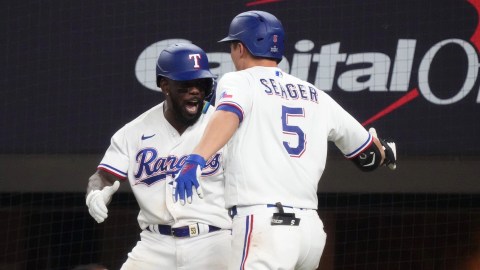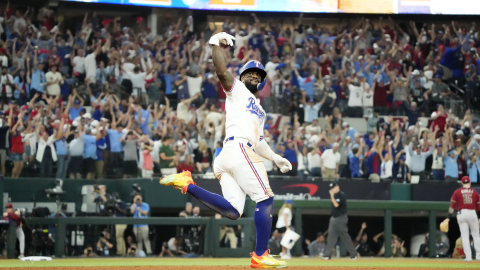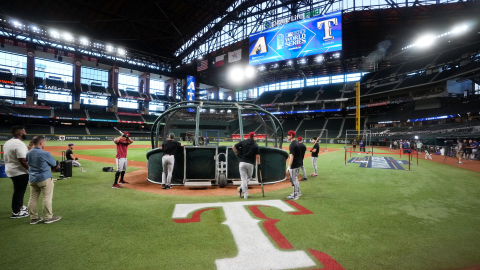 It’s safe to say that this year’s World Series features the two best teams in baseball.
It’s safe to say that this year’s World Series features the two best teams in baseball.
For the first time since 1999, the American League and National League wins leaders will face off in the Fall Classic. The Red Sox and Cardinals each posted 97 wins during the regular season before embarking on their respective playoff journeys.
Now, each team sits four wins away from being crowned champion of the baseball world, and it’s almost impossible to pick a favorite. The even wins total isn’t a mirage. These two teams represent as close a matchup as you’ll find.
The Red Sox, of course, took down the Rays and Tigers en route to earning a World Series berth, while the Cardinals disposed of the Pirates and Dodgers. Each team won its respective LCS in six games.
This isn’t the first time that Boston and St. Louis have hooked up in the World Series. The Sox and Cards went toe-to-toe in 1946, 1967 and 2004, with St. Louis winning two of the three series.
The 2013 World Series will kick off at Fenway Park on Wednesday. But before Jon Lester delivers the first pitch, let’s take a look at how these two teams match up.
Starting rotation
Here’s a look at the probables for the first four games of the World Series.
Game 1 at Boston: Jon Lester, LHP vs. Adam Wainwright, RHP
Game 2 at Boston: John Lackey, RHP vs. Michael Wacha, RHP
Game 3 at St. Louis: Clay Buchholz, RHP vs. Joe Kelly, RHP
Game 4 at St. Louis: Jake Peavy, RHP vs. Lance Lynn, RHP
The Red Sox went into each of their first two playoff series seemingly at a disadvantage in the starting pitching department. They lived to tell about it, although it’s still difficult to give the Red Sox an edge over the Cardinals in terms of starters.
Adam Wainwright is a legitimate ace. So while Jon Lester often has the look and feel of an ace, it’s safe to say that the Cardinals will have a distinct pitching advantage in at least two of the games.
Wainwright — despite not yet having a Cy Young on his resume — has won at least 19 games on three separate occasions, including 20 in 2010. His 3.10 ERA since 2007 is the third-best mark in the majors among pitchers who have logged at least 1,000 innings. He trails only Clayton Kershaw and Felix Hernandez. Oh yeah, and Wainwright is 4-1 with a 2.10 ERA in 16 career playoff appearances (seven starts).
And what more can be said about Michael Wacha? The rookie only pitched 64 2/3 innings during the regular season, so labeling him an “ace” might be a little premature. But everything that the 22-year-old has done this postseason has been ace-like.
Wacha, who went 4-1 with a 2.78 ERA during the regular season, is 3-0 with an 0.43 ERA (one earned run in 21 innings) in three postseason starts. He has only given up eight hits, and his playoff WHIP is a minuscule 0.57. He outpitched Kershaw — widely considered the best pitcher in baseball — twice during the NLCS.
Things should even out a bit in Games 3 and 4, although fortunately for the Cardinals, that’s also when the series shifts back to St. Louis.
Joe Kelly and Lance Lynn both enjoyed solid regular seasons — which is why the Cardinals finished third in the majors in rotation ERA — but there are a few questions as we head into the final series of 2013. Similarly, there are some concerns about Jake Peavy, who was awful in his last start in Game 4 of the ALCS in Detroit.
The 1-2 combo of Wainwright and Wacha will likely pitch five of the seven games — if the series lasts that long — so the Red Sox will have to scratch and claw for every run. (So, just another series for Boston, right?)
Advantage: Cardinals
Bullpen
Red Sox
Koji Uehara, RHP
Junichi Tazawa, RHP
Craig Breslow, LHP
Brandon Workman, RHP
Franklin Morales, LHP
Ryan Dempster, RHP
Felix Doubront, LHP
Cardinals
Trevor Rosenthal, RHP
Carlos Martinez, RHP
John Axford, RHP
Edward Mujica, RHP
Seth Maness, RHP
Randy Choate, LHP
Kevin Siegrist, LHP
Shelby Miller, RHP
The Red Sox’ biggest question mark entering the postseason resided in the bullpen — more specifically, the bridge to Koji Uehara. Not only has the unit stepped up, but it’s been Boston’s most valuable asset.
The trio of Uehara, Junichi Tazawa and Craig Breslow has been dominant, and Brandon Workman has kept things under control in his four appearances. The quartet has received a heavy workload thus far, and we should expect more of the same in the World Series. Thus, it’ll be important for the Red Sox’ starters to work into at least the sixth inning of each game.
The Cardinals’ bullpen — anchored by some young guns — has also been strong.
Trevor Rosenthal has been lights out since taking over the closing duties full-time toward the end of September, and already has a strong playoff track record. The 23-year-old, who is in the midst of just his second season, hasn’t given up a run in 13 playoff appearances (15 2/3 innings), while surrendering only five hits in that span.
Rosenthal isn’t the only flamethrower in the Cardinals’ bullpen. Carlos Martinez, John Axford and Kevin Siegrist can all bring the heat. Martinez has been vital in stabilizing the eighth inning in St. Louis, while Axford — despite some hiccups — has been a nice addition after struggling in Milwaukee to begin the season. Expect some key showdowns involving Kevin Siegrist and/or Randy Choate and Boston’s left-handed bats, most notably David Ortiz.
The Red Sox’ approach against the Tigers was to drive up the starters’ pitch counts in order to get into Detroit’s shaky bullpen. That approach worked, but it might not yield similar results against the Cardinals, whose bullpen is far better than the Tigers’ relief corps.
While the bullpens offer another intriguing — and nearly even — matchup, the slight edge goes to Boston. The Cardinals’ bullpen has been very good, but the Red Sox’ bullpen has been great.
Advantage: Red Sox
Offense
Timely hits.
Really, every series comes down to which team best takes advantage of its scoring chances. But it’ll be a particularly important aspect of this series, as both offenses rely on building threats.
The World Series will pit two of baseball’s most productive offenses against each other. The Red Sox (853) and Cardinals (783) finished the regular season first and third, respectively, in runs scored, although neither finished in the top five in home runs. The Red Sox finished sixth in long balls with 178, while the Cardinals finished 27th with 125.
The two teams instead rely on getting on base — the Red Sox ranked first with a .349 on-base percentage and the Cardinals ranked third with a .332 on-base percentage — and then delivering in those situations. St. Louis owned an insane .330 average with runners in scoring position during the regular season, which was tops in the majors, while Boston finished third in the majors with a .278 mark in such situations.
Both offenses have struggled in the postseason, but it’s to be expected when you face the Tigers and Dodgers in the LCS. We should see an uptick in offensive output this series, although it might come a bit easier for the Cardinals.
The Red Sox are at a distinct disadvantage when playing in St. Louis, as Boston will need to remove either Mike Napoli or David Ortiz from the starting lineup each game. That’s huge, especially when you consider the biggest hits of the ALCS.
The Cardinals, meanwhile, will be getting team RBI leader Allen Craig back, and he’ll be able to slide right into the middle of the order as St. Louis’ designated hitter while playing in Boston. Matt Adams, who came on strong at the tail end of the NLCS, can remain at first base while Mike Matheny gauges how healthy Craig is before the series shifts back to St. Louis.
There aren’t many teams in baseball who match up with the Red Sox offensively, but the Cardinals are one of them. Matt Carpenter has evolved into a great leadoff hitter, Matt Holliday is still a force and Carlos Beltran is one of the greatest postseason performers ever.
It’ll be interesting to see if someone unforeseen emerges as an X factor — looking at you, Xander Bogaerts and Shane Robinson — but for now, the Cardinals have the slightest of edges.
Advantage: Cardinals
Bench
This continues to be the one area in which the Red Sox hold a big advantage over their opponent, even if the Cardinals feature a much better bench than the Tigers.
Allen Craig and/or Matt Adams — whichever doesn’t start in St. Louis — will provide plenty of pop off the pine, and Shane Robinson and/or Jon Jay — again, depending on who starts — should also provide a boost to the Cardinals. However, Boston’s bench remains one of the club’s biggest assets, and John Farrell will continue to exploit every possible matchup advantage in that regard.
Advantage: Red Sox
Defense
Overall, the Red Sox are slightly better defensively. The Cardinals — like the Red Sox — have a solid middle infield in Pete Kozma and Matt Carpenter, but Boston owns an edge in the outfield.
Keep an eye on catcher Yadier Molina, though. The Cardinals’ ability — or inability — to neutralize the Red Sox’ aggressive baserunning will be one of the biggest keys to this series.
Advantage: Red Sox
Manager
This, really, should be a push. Mike Matheny has done a terrific job of instilling confidence and trust in his rookies, while John Farrell has been at the center of Boston’s turnaround. But because pushes are forbidden, Farrell is getting the slight nod, despite a questionable move here and there.
Call it hometown bias. Call it ignorance. Call it whatever you want. We’ll all forget about it soon enough.
Advantage: Red Sox
Prediction
Red Sox in seven.
These two teams are very similar. Each has good starting pitching, a strong bullpen and a very potent offense. The result is one of the most evenly-matched World Series in recent memory.
The Red Sox are coming off a tough series with the Tigers, but the Cardinals pose a much tougher matchup. St. Louis — unlike Detroit — has a bullpen that should limit Boston’s late-inning damage, and Yadier Molina’s presence behind the plate has the potential to neutralize the aggressive baserunning that has been a staple of the Red Sox’ game. If the Sox play like they did for much of the ALCS, they’ll be in big trouble.
That being said, there’s just something about this year’s Red Sox team that makes it difficult to pick against them. Maybe picking the Red Sox in this instance requires a hunch — which is fitting given some of Farrell’s recent managerial moves — but it’s a leap of faith I’m willing to take. Every time Boston looks down and out, it comes back stronger than ever. Why should I expect that to suddenly change?
The evenness of these two teams will be reflected in the series, as one or two timely hits will likely be the difference. Expect the Red Sox to produce those hits, including one late in Game 7.
Red Sox in seven long, gut-wrenching, nail-biting, stressful contests.
Have a question for Ricky Doyle? Send it to him via Twitter at @TheRickyDoyle or send it here.




